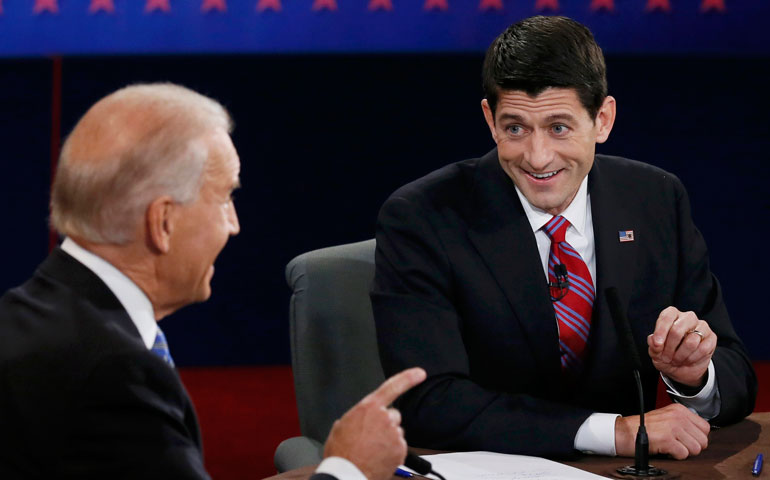
Vice President Joe Biden and Republican vice presidential nominee Paul Ryan debate in Danville, Ky., Oct. 11. (CNS/Reuters/Rick Wilking)
It's not just Catholics that are in focus this election cycle. The church's teachings have rather unabashedly taken the national spotlight too.
Screens across the country showcased that focus Oct. 11, when for the first time in U.S. history two Catholics met to debate who should become vice president.
Toward the end of the event, about 51.4 million viewers saw Democratic Vice President Joe Biden and Republican vice presidential nominee Paul Ryan answer how their faith had informed their views on the criminalization of abortion.
While that issue may be on the minds of many Catholics this election, including more than a few bishops, the wider range of the church's social teaching has also made news.
More than 150 of the U.S. church's most noted thinkers released a statement Oct. 9 calling for Catholics to focus on the "fullness" of church teaching -- asking them not only to consider abortion, but also teachings on the proper orientation of economic and social policies.
Speaking to NCR about the statement, one of its signers, theologian David Cloutier, said the writers thought there "needs to be clarity about the ways in which the principles stated by candidates on various issues are in tension with the principles of the Catholic tradition."
While the bishops have made clear they believe that Biden's position against the criminalization of abortion is in contradiction with church teaching, said Cloutier, an associate professor of theology at Mount St. Mary's University in Emmitsburg, Md., there hasn't been as clear an assessment of how the candidates align with other aspects of Catholic teaching.
"There seems to be an inability to see how differences on economic policy could be differences at the level of those principles," he said.
The signers, who included a number of prominent Catholic theologians, sisters and advocates, focused specifically on Ryan, a congressman from Wisconsin. Ryan put together the Republicans' failed 2012 federal budget proposal, which was estimated by the nonpartisan Center on Budget and Policy Priorities to cut federal programs that benefit low-income earners by some $3.3 trillion.
"We write as Catholic theologians, academics and ministers concerned for our nation and for the integrity of the teachings of the Catholic Church," reads the statement, titled "On All of Our Shoulders: A Catholic Call to Protect the Endangered Common Good."
"Our concern is that Ryan and his Catholic supporters, must be informed -- as prochoice candidates and Catholics who vote for them are perennially and appropriately reminded -- that some of his positions are fundamentally at odds with the teachings of the Catholic Church," it continues.
Citing a number of papal encyclicals that focus on the obligation of the state to provide for those in need, including Pope Benedict XVI's 2009 Caritas in Veritate and Blessed Pope John Paul II's 1991 Centesimus Annus, the statement lays out five principles that the signers say are "most in danger of being ignored or distorted," including:
- The "Catholic view of the human person" as a social being and not only as an individual;
- That government "has an essential role to play in protecting and promoting the common good";
- That "economic forces must be reckoned among any serious account of the threats to society and human dignity."
The theologians' statement quickly drew ire from more conservative Catholic circles. Within five days of its release, two writers at the right-leaning magazine First Things criticized the signers for appearing too partisan and for criticizing Ryan's previous endorsement of the libertarian writer Ayn Rand, whose book Atlas Shrugged the statement references.
Writing on the magazine's website Oct. 12, noted Catholic law professor Robert George called it a "set of Democratic Party talking points festooned with quotations from St. Thomas Aquinas."
"It is a thoroughly unedifying spectacle," wrote George, the McCormick Professor of Jurisprudence at Princeton University and a member of Republican presidential nominee Gov. Mitt Romney's "Catholics for Romney Coalition."
Asked by NCR how he would respond to the criticisms, another of the signers, theologian Vincent Miller, asked, "Why would it be inappropriate to raise these principles of the church's magisterium -- that have been taught by several popes, that clearly apply to this policy proposal and the philosophy that inspires it?"
Referencing the Letter to the Hebrews, in which the word of God is described as "sharper than any two-edged sword," Miller said church teaching "cuts both ways, it cuts both parties."
"It challenges both parties," said Miller, the Gudorf Chair in Catholic Theology and Culture at the Marianist-run University of Dayton in Ohio. "And why would one ever challenge bringing up these things that are clearly relevant to these debates we're having?"
A question that seems to indicate the meaning of Catholic teaching remains in the spotlight inside the church, too.
More
For the full text of the theologians' statement, and a full list of the signers, go to onourshoulders.org.
[Joshua J. McElwee is an NCR staff writer. His email address is jmcelwee@ncronline.org.]


